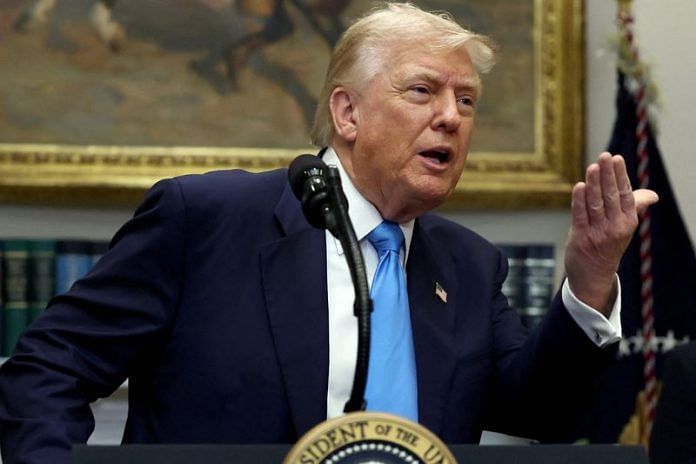By Dietrich Knauth
(Reuters) -U.S. appeals court judges sharply questioned on Thursday whether President Donald Trump’s tariffs were justified by the president’s emergency powers, after a lower court said he exceeded his authority with sweeping levies on imported goods.
The U.S. Court of Appeals for the Federal Circuit in Washington, D.C., is considering the legality of “reciprocal” tariffs that Trump imposed on a broad range of U.S. trading partners in April, as well as tariffs imposed in February against China, Canada and Mexico.
In hearing arguments in two cases brought by five small U.S. businesses and 12 Democratic-led U.S. states, judges pressed government lawyer Brett Shumate to explain how the International Emergency Economic Powers Act (IEEPA), a 1977 law historically used for sanctioning enemies or freezing their assets, gave Trump the power to impose tariffs.
Trump is the first president to use IEEPA to impose tariffs.
“IEEPA doesn’t even say tariffs, doesn’t even mention them,” one of the judges said.
Shumate said that the law allows for “extraordinary” authority in an emergency, including the ability to stop imports completely. He said IEEPA authorizes tariffs because it allows a president to “regulate” imports in a crisis.
The states and businesses challenging the tariffs argued that they are not permissible under IEEPA and that the U.S. Constitution grants Congress, and not the president, authority over tariffs and other taxes.
Neal Katyal, a lawyer for the businesses, said the government’s justification for the tariffs amounted to “a breathtaking claim to power that no president has asserted in years.”
The arguments – one day before Trump plans to increase tariff rates on imported goods from nearly all U.S. trading partners – mark the first test before a U.S. appeals court of the scope of his tariff authority. The president has made tariffs a central instrument of his foreign policy, wielding them aggressively in his second term as leverage in trade negotiations and to push back against what he has called unfair practices.
Trump has said the April tariffs were a response to persistent U.S. trade imbalances and declining U.S. manufacturing power.
He said the tariffs against China, Canada and Mexico were appropriate because those countries were not doing enough to stop illegal fentanyl from crossing U.S. borders. The countries have denied that claim.
Shumate cited a 1975 appeals court decision that authorized President Richard Nixon’s across-the board surcharge of 10% on imported merchandise to slow inflation. But that decision added that the president did not have authority to impose “whatever tariff rates he deems desirable.”
Shumate also said that courts cannot review a president’s actions under IEEPA or impose additional limits that are not included in the law. Several judges said that the argument would essentially allow one law, IEEPA, to overwrite all other U.S. laws related to tariffs and imports.
The case is being heard by a panel of all of the court’s active judges, eight appointed by Democratic presidents and three appointed by former Republican presidents. The timing of the court’s decision is uncertain, and the losing side will likely appeal quickly to the U.S. Supreme Court.
TRADE NEGOTIATIONS
Tariffs are starting to build into a significant revenue source for the federal government, with customs duties in June quadrupling to about $27 billion, a record, and through June have topped $100 billion for the current fiscal year. That income could be crucial to offset lost revenue from Trump’s tax bill passed into law earlier this month.
But economists say the duties threaten to raise prices for U.S. consumers and reduce corporate profits. Trump’s on-again, off-again tariff threats have roiled financial markets and disrupted U.S. companies’ ability to manage supply chains, production, staffing and prices.
On May 28, a three-judge panel of the U.S. Court of International Trade sided with the Democratic states and small businesses that challenged Trump. It said that the IEEPA did not authorize tariffs related to longstanding trade deficits.
The Federal Circuit has allowed the tariffs to remain in place while it considers the administration’s appeal.
The case will have no impact on tariffs levied under more traditional legal authority, such as duties on steel and aluminum imports.
The president recently announced trade deals that set tariff rates on goods from the European Union and Japan, following smaller trade agreements with Britain, Indonesia and Vietnam. Trump’s Department of Justice has argued that limiting the president’s tariff authority could undermine ongoing trade negotiations, while other Trump officials have said that negotiations have continued with little change after the initial setback in court.
Trump has set an August 1 date for higher tariffs on countries that don’t negotiate new trade deals.
There are at least seven other lawsuits challenging Trump’s invocation of IEEPA, including cases brought by other small businesses and California.
A federal judge in Washington, D.C., ruled against Trump in one of those cases, and no judge has yet backed Trump’s claim of unlimited emergency tariff authority.
(Reporting by Dietrich Knauth; Editing by David Bario, Noeleen Walder, Leslie Adler, Deepa Babington and Nick Zieminski)
Disclaimer: This report is auto generated from the Reuters news service. ThePrint holds no responsibility for its content.




